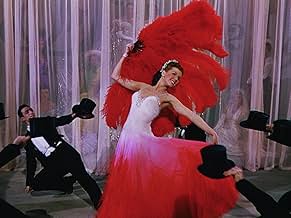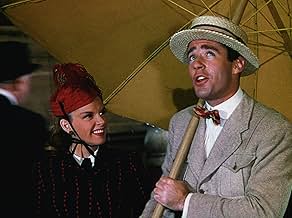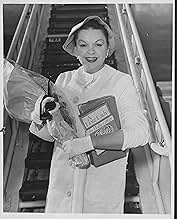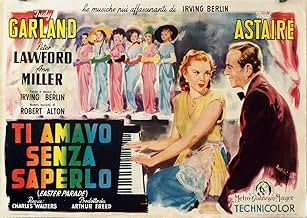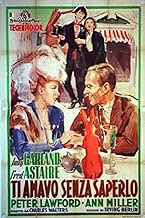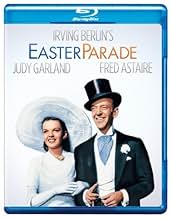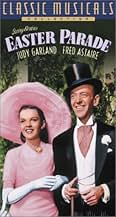IMDb रेटिंग
7.3/10
12 हज़ार
आपकी रेटिंग
अपनी भाषा में प्लॉट जोड़ेंA nightclub performer hires a naive chorus girl to become his new dance partner to make his former partner jealous and to prove he can make any partner a star.A nightclub performer hires a naive chorus girl to become his new dance partner to make his former partner jealous and to prove he can make any partner a star.A nightclub performer hires a naive chorus girl to become his new dance partner to make his former partner jealous and to prove he can make any partner a star.
- 1 ऑस्कर जीते
- कुल 5 जीत
John Albright
- Western Union Messenger
- (बिना क्रेडिट के)
Lola Albright
- Hat Model
- (बिना क्रेडिट के)
- …
Don Anderson
- Passerby on Street
- (बिना क्रेडिट के)
Shirley Ballard
- Showgirl
- (बिना क्रेडिट के)
Norman S. Barker
- Trombone player in bar
- (बिना क्रेडिट के)
Jimmy Bates
- Boy
- (बिना क्रेडिट के)
Virginia Bates
- Model
- (बिना क्रेडिट के)
Margaret Bert
- Florist
- (बिना क्रेडिट के)
Lulu Mae Bohrman
- Restaurant Patron
- (बिना क्रेडिट के)
Ralph Brooks
- Diner at Rooftop Show
- (बिना क्रेडिट के)
फ़ीचर्ड समीक्षाएं
By far the best bit of this movie is early on in the running time, when the wonderful Fred Astaire has a routine in a toy shop, to the Berlin number Drum Crazy'. He's there to get an Easter present for his dancing partner (played with energy by Ann Miller), but she has a bombshell to drop: she's leaving him to join a bigger name stage show, and he's left high and dry without an act.
Step forward Judy Garland, as a waitress who Fred thinks might be able to sing and dance. At first she's reluctant, and hopeless, but of course, this being MGM mush she falls for Fred and suddenly finds her talent. At this sort of thing Garland had no peer.
Also in the cast are Peter Lawford, as a rich no-hoper with a heart who first pursues Garland, and then steps aside for Fred (heading for Miller on the rebound). He sings A Fella With An Umbrella not very well but is certainly easier on the eye than Astaire. A tiny but scene-stealing role is given to Jules Munshin, who would be seen the following year in On The Town', as a waiter describing just how the green onion salad listed on the menu is prepared.
The lead was not originally planned for Fred, but for the younger and more athletic dancer Gene Kelly, but when Kelly injured his leg the way was clear for Astaire to be coaxed out of retirement. He continued to appear in musicals for another twenty years.
The songs in Easter Parade' are a bit of a rag-bag classics such as Easter Parade, Steppin' Out With My Baby, Shakin' The Blues Away etc. jostle with old vaudeville numbers like When The Midnight Choo-Choo Leaves For Alabam'. The result is a bit of a mish-mash. Perhaps the best song shot for the movie was the one omitted before release Mr Monotony, performed by Garland in her trademark costume of the top half of a tux and tights (two years before Summer Stock' and the Get Happy number). This number can be seen in That's Entertainment III, released in 1994.
Easter Parade' is good, but unbelievable. I never could understand the appeal of Fred Astaire beyond his dancing, and the supposition that a character of Garland's age would be interested in him is stretching things a bit. That aside, it has excellent Technicolor and moves along at a steady pace.
Step forward Judy Garland, as a waitress who Fred thinks might be able to sing and dance. At first she's reluctant, and hopeless, but of course, this being MGM mush she falls for Fred and suddenly finds her talent. At this sort of thing Garland had no peer.
Also in the cast are Peter Lawford, as a rich no-hoper with a heart who first pursues Garland, and then steps aside for Fred (heading for Miller on the rebound). He sings A Fella With An Umbrella not very well but is certainly easier on the eye than Astaire. A tiny but scene-stealing role is given to Jules Munshin, who would be seen the following year in On The Town', as a waiter describing just how the green onion salad listed on the menu is prepared.
The lead was not originally planned for Fred, but for the younger and more athletic dancer Gene Kelly, but when Kelly injured his leg the way was clear for Astaire to be coaxed out of retirement. He continued to appear in musicals for another twenty years.
The songs in Easter Parade' are a bit of a rag-bag classics such as Easter Parade, Steppin' Out With My Baby, Shakin' The Blues Away etc. jostle with old vaudeville numbers like When The Midnight Choo-Choo Leaves For Alabam'. The result is a bit of a mish-mash. Perhaps the best song shot for the movie was the one omitted before release Mr Monotony, performed by Garland in her trademark costume of the top half of a tux and tights (two years before Summer Stock' and the Get Happy number). This number can be seen in That's Entertainment III, released in 1994.
Easter Parade' is good, but unbelievable. I never could understand the appeal of Fred Astaire beyond his dancing, and the supposition that a character of Garland's age would be interested in him is stretching things a bit. That aside, it has excellent Technicolor and moves along at a steady pace.
For the only teaming of Fred Astaire and Judy Garland, Gene Kelly had to break an ankle playing touch football although he told the studio it was in rehearsal. So Fred Astaire who after another Irving Berlin musical extravaganza, Blue Skies at Paramount, got pulled out of retirement for this film. It was a happy accident for film fans.
Easter Parade by this time had become the national anthem for Easter and enjoys a grand seasonal popularity as Irving Berlin's White Christmas also. It was originally written for the musical revue As Thousands Cheer in 1933 and sung as a duet by Clifton Webb and Marilyn Miller. Bing Crosby reprised it in Holiday Inn in a very nice number driving a horsedrawn sleigh from church Easter services. But usually when it is presented visually, the clip of Judy Garland singing it in the finale is the one always shown.
By the way the melody originally was for a lyric entitled Smile and Show Your Dimple which bombed for Irving Berlin. Berlin was quoted as saying that popular songs are a perfect marriage between words and music and in this case the melody got divorced and married a second lyric successfully.
Easter Parade is a good mixture of old Irving Berlin material and new songs written for this film. Fred Astaire shines with one of the new ones in Stepping Out With My Baby which is a good followup to Putting On the Ritz which Astaire sang and danced to in Blue Skies. And Judy just shines in Better Luck Next Time.
The plot is a pretty simple one and for the MGM opulence that their musicals were known for their are very few actual speaking roles in this film. It's a romantic quadrangle with Fred Astaire being dumped by his erstwhile partner Ann Miller and then taking on Judy Garland in one of those 'I'll show her' moments of bravado. Peter Lawford's around to get whoever Astaire doesn't.
The acting honors in Easter Parade go to Judy. For all that talent Judy Garland was a most insecure person in life and she drew from that in bringing Hannah Brown to the screen.
Ann Miller's big number is Shaking the Blues Away which Ruth Etting introduced in 1927. Doris Day in fact does it in Love Me or Leave Me. Still Ann makes it more of a dance number than Doris did which is what Irving Berlin originally intended it to be.
The thing about Easter Parade and so many other films like it is that all that talent was contracted to that studio. You can't make a film like Easter Parade today because you'd have to pay full market price for the talent, even as Irving Berlin's numbers slip year after year into public domain.
The Easter parade with women dressed in their finest most tasteful frock is still a New York tradition on Easter Sunday. So is this film.
Easter Parade by this time had become the national anthem for Easter and enjoys a grand seasonal popularity as Irving Berlin's White Christmas also. It was originally written for the musical revue As Thousands Cheer in 1933 and sung as a duet by Clifton Webb and Marilyn Miller. Bing Crosby reprised it in Holiday Inn in a very nice number driving a horsedrawn sleigh from church Easter services. But usually when it is presented visually, the clip of Judy Garland singing it in the finale is the one always shown.
By the way the melody originally was for a lyric entitled Smile and Show Your Dimple which bombed for Irving Berlin. Berlin was quoted as saying that popular songs are a perfect marriage between words and music and in this case the melody got divorced and married a second lyric successfully.
Easter Parade is a good mixture of old Irving Berlin material and new songs written for this film. Fred Astaire shines with one of the new ones in Stepping Out With My Baby which is a good followup to Putting On the Ritz which Astaire sang and danced to in Blue Skies. And Judy just shines in Better Luck Next Time.
The plot is a pretty simple one and for the MGM opulence that their musicals were known for their are very few actual speaking roles in this film. It's a romantic quadrangle with Fred Astaire being dumped by his erstwhile partner Ann Miller and then taking on Judy Garland in one of those 'I'll show her' moments of bravado. Peter Lawford's around to get whoever Astaire doesn't.
The acting honors in Easter Parade go to Judy. For all that talent Judy Garland was a most insecure person in life and she drew from that in bringing Hannah Brown to the screen.
Ann Miller's big number is Shaking the Blues Away which Ruth Etting introduced in 1927. Doris Day in fact does it in Love Me or Leave Me. Still Ann makes it more of a dance number than Doris did which is what Irving Berlin originally intended it to be.
The thing about Easter Parade and so many other films like it is that all that talent was contracted to that studio. You can't make a film like Easter Parade today because you'd have to pay full market price for the talent, even as Irving Berlin's numbers slip year after year into public domain.
The Easter parade with women dressed in their finest most tasteful frock is still a New York tradition on Easter Sunday. So is this film.
Don't you just love those old 40's musicals? Easter Parade is certainly one of the best, with Fred Astaire doing his amazing flashy but precise dancing, Judy Garland using her legendary voice to sing right from her heart into yours, and Ann Miller doing her own unique style of dancing and tapping while belting out great songs. And of course, everybody in the film uses any excuse to sing yet another song, usually dancing to it as well.
One of the special sequences has Fred Astaire dancing in slow motion while the rest of the cast dance at normal speed behind him! Sure, we can do that these days with computers, but remember this film was made in 1948!!
Of course there's the usual plot - Boy meets girl, they fall in love, have a misunderstanding, but get together again just in time for the big finishing number. That used to really get the audiences in, in those days, and they repeated that theme in every musical that ever was.
Any weak spots? Several of the film's routines seem a little amateurish by today's standards. For example, the waiter tossing his invisible salad just to do a bit of clowning seems a little contrived. Also, the film is supposedly set in 1912, so all the 1948 fashions and hairstyles are completely anachronistic - but what does that matter, after all, it's just an enjoyable romp.
I've given this film eight out of ten, but if I could just vote on Judy Garland's singing and Fred Astaire's dancing, I'd certainly give them ten out of ten. This is definitely a "must-see" film, just for those two incredible talents!
One of the special sequences has Fred Astaire dancing in slow motion while the rest of the cast dance at normal speed behind him! Sure, we can do that these days with computers, but remember this film was made in 1948!!
Of course there's the usual plot - Boy meets girl, they fall in love, have a misunderstanding, but get together again just in time for the big finishing number. That used to really get the audiences in, in those days, and they repeated that theme in every musical that ever was.
Any weak spots? Several of the film's routines seem a little amateurish by today's standards. For example, the waiter tossing his invisible salad just to do a bit of clowning seems a little contrived. Also, the film is supposedly set in 1912, so all the 1948 fashions and hairstyles are completely anachronistic - but what does that matter, after all, it's just an enjoyable romp.
I've given this film eight out of ten, but if I could just vote on Judy Garland's singing and Fred Astaire's dancing, I'd certainly give them ten out of ten. This is definitely a "must-see" film, just for those two incredible talents!
Yes, this movie, arguably one of Garland's best at M-G-M, is certainly something to look at. Cute story, excellent cast, gorgeous costumes (Ann's breathtaking white and red gown from the Magazine Cover number and Judy's marvelous emerald-coloured dress at the Ziegfeld Follies after opening night), and have I mentiond the SWELL songs? Drum Crazy is awfully entertaining, Shakin' the Blues Away is classic Miller (in other words fast and superb), Better Luck Next Time is heartbreaking, and so many others are just plain GOOD. A must see for any fans of Judy Garland, Fred Astaire, Ann Miller, Peter Lawford, Jules Munshin (in a funny bit as a waiter), or just great fun.
There's an incredible backstory behind Easter Parade. Fred Astaire had announced his retirement from movies, and Gene Kelly was attached to the new Judy Garland musical set at Eastertime. Then, Gene experienced every dancer's nightmare and broke his leg. He called Fred up and asked if he'd take his place. And now we have Easter Parade!
Now that you know Gene Kelly was supposed to play the lead, it's understandable that he was supposed to sing the seductive "It Only Happens When I Dance with You" to Ann Miller. How would Fred Astaire handle it? He's not usually marketed as having much sex appeal. Well, move over Gene Kelly; Fred's just fine. In fact, although there are plenty of great numbers in Easter Parade, that one's my favorite because of the different tone Fred takes with himself.
There are quite a few famous songs from this movie, most notably the performance Fred and Judy give dressed like bums: "A Couple of Swells". Peter Lawford plays the other man in both love triangles-although who would ever pick him over Fred Astaire?-and he gets to sing the cute "A Fella with an Umbrella" when he meets Judy Garland. "Steppin' Out with My Baby" is another performance on the stage-Fred's character is a performer looking for a new partner-that utilizes groundbreaking camerawork that's still fantastic to watch. Fred dances in slow motion while the chorus girls behind him move in regular time, and the layered look is jaw-droppingly innovative for 1948.
I've praised several of Irving Berlin's songs from the movie, but they're not all fantastic. "I was born in Michigan, and I wish and wish again. . ." is a lyric from one of the silly songs Judy has to sing. So, while there will be a few scenes that will make you cringe and leave the room for more popcorn, most of the movie is pretty fun to watch. I own a copy, and we watch it every few years on Easter when we want a break from our usual Ben-Hur. I always like Fred Astaire's movies, so it has to be really stinky for me to not recommend it. I mean, who else but Fred can walk into a toy store and turn the toys into a dance number? Watch his dance "Drum Crazy" in Easter Parade and ask him through the television why he bothered trying to retire.
Now that you know Gene Kelly was supposed to play the lead, it's understandable that he was supposed to sing the seductive "It Only Happens When I Dance with You" to Ann Miller. How would Fred Astaire handle it? He's not usually marketed as having much sex appeal. Well, move over Gene Kelly; Fred's just fine. In fact, although there are plenty of great numbers in Easter Parade, that one's my favorite because of the different tone Fred takes with himself.
There are quite a few famous songs from this movie, most notably the performance Fred and Judy give dressed like bums: "A Couple of Swells". Peter Lawford plays the other man in both love triangles-although who would ever pick him over Fred Astaire?-and he gets to sing the cute "A Fella with an Umbrella" when he meets Judy Garland. "Steppin' Out with My Baby" is another performance on the stage-Fred's character is a performer looking for a new partner-that utilizes groundbreaking camerawork that's still fantastic to watch. Fred dances in slow motion while the chorus girls behind him move in regular time, and the layered look is jaw-droppingly innovative for 1948.
I've praised several of Irving Berlin's songs from the movie, but they're not all fantastic. "I was born in Michigan, and I wish and wish again. . ." is a lyric from one of the silly songs Judy has to sing. So, while there will be a few scenes that will make you cringe and leave the room for more popcorn, most of the movie is pretty fun to watch. I own a copy, and we watch it every few years on Easter when we want a break from our usual Ben-Hur. I always like Fred Astaire's movies, so it has to be really stinky for me to not recommend it. I mean, who else but Fred can walk into a toy store and turn the toys into a dance number? Watch his dance "Drum Crazy" in Easter Parade and ask him through the television why he bothered trying to retire.
क्या आपको पता है
- ट्रिवियाGene Kelly was originally scheduled to play Don, but he broke his ankle playing volleyball in his backyard. It was his suggestion that he be replaced by Fred Astaire. Cyd Charisse was up for the role of Nadine, but a torn ligament in either one or both of her knees forced her to drop out. She was replaced by Ann Miller.
- गूफ़A Police officer writes Jonathan (Peter Lawford) a ticket for parking beside a fire hydrant. As he hands over the ticket, he bumps the hydrant which wobbles.
- इसके अलावा अन्य वर्जनThere is an Italian edition of this film on DVD, re-edited in double version (1.33:1 and 1.78:1) with the contribution of film historian Riccardo Cusin. This version is also available for streaming on some platforms.
- कनेक्शनEdited into Histoire(s) du cinéma: Seul le cinéma (1994)
- साउंडट्रैकHappy Easter
(uncredited)
Written by Irving Berlin
Performed by Fred Astaire
Performed also by Fred Astaire and Judy Garland
टॉप पसंद
रेटिंग देने के लिए साइन-इन करें और वैयक्तिकृत सुझावों के लिए वॉचलिस्ट करें
- How long is Easter Parade?Alexa द्वारा संचालित
विवरण
- रिलीज़ की तारीख़
- कंट्री ऑफ़ ओरिजिन
- भाषाएं
- इस रूप में भी जाना जाता है
- Happy Easter
- फ़िल्माने की जगहें
- उत्पादन कंपनी
- IMDbPro पर और कंपनी क्रेडिट देखें
बॉक्स ऑफ़िस
- बजट
- $25,03,654(अनुमानित)
- दुनिया भर में सकल
- $1,605
- चलने की अवधि
- 1 घं 43 मि(103 min)
- पक्ष अनुपात
- 1.37 : 1
इस पेज में योगदान दें
किसी बदलाव का सुझाव दें या अनुपलब्ध कॉन्टेंट जोड़ें







